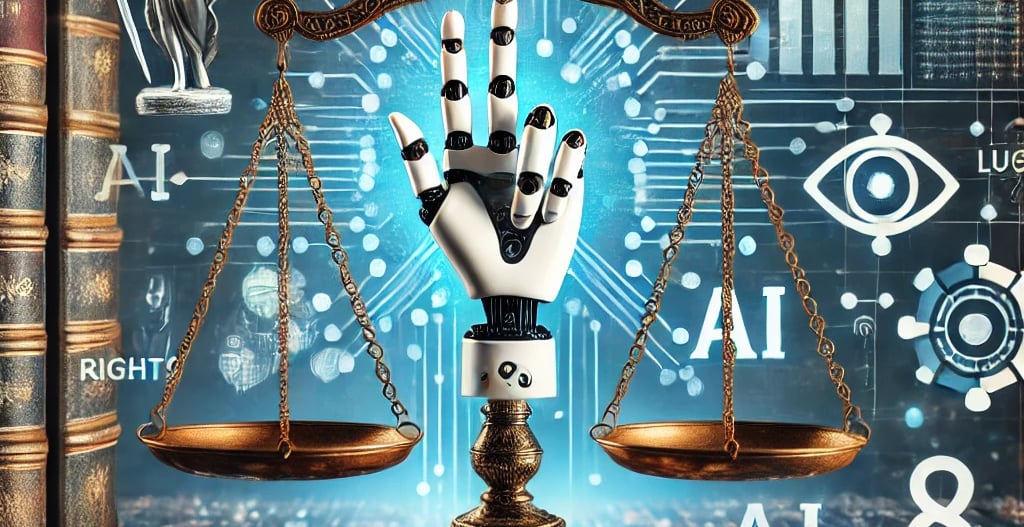Does the State’s Negligence in ensuring the Accuracy of AI systems Amount to a breach of its Sovereign duty to protect Human rights?
This paper examines whether the State’s failure to ensure AI system accuracy constitutes a breach of its sovereign duty to protect human rights. Drawing on key Indian court precedents, it highlights how AI biases or inaccuracies may infringe upon the right to life (Article 21, Maneka Gandhi v. Union of India), equality (Articles 14 & 15, State of Maharashtra v. Chandrabhan), privacy (K.S. Puttaswamy v. Union of India), and dignity (Navtej Singh Johar v. Union of India). It argues that unregulated AI systems could perpetuate discrimination, wrongful imprisonment, and data misuse, making State oversight essential to uphold constitutional and international human rights obligations.


Does the State’s Negligence in ensuring the Accuracy of AI systems Amount to a breach of its Sovereign duty to protect Human rights?
We can use pertinent information from Indian court precedents that highlight the State's obligation to uphold human rights and regulate cutting-edge technologies like artificial intelligence (AI) to answer the question of whether the State's carelessness in guaranteeing the accuracy of AI systems amounts to a violation of its sovereign duty to protect human rights.
First ruling: Article 21 of the Indian Constitution guarantees the right to life and personal liberty (Maneka Gandhi v. Union of India, 1978). The Supreme Court broadened the application of Article 21 in Maneka Gandhi v. Union of India (1978), highlighting that the right to life and personal liberty encompasses the right to live with dignity. This decision also made it clear that the State and its agencies must always operate in a fair, reasonable, and just manner. An individual's right to dignity, liberty, and equality under Article 21 would be violated if AI systems, because of bias or inaccuracy, ended up harming their lives (for example, through discriminatory hiring practices or wrongful imprisonment).Should AI systems result in injury or unfairness, including erroneous detention or skewed judgement, the government's failure to guarantee it can be argued that their fairness and truth violate the right to life and individual freedom.
Judgement 2: Articles 14 and 15 of the Indian Constitution provide the right to equality and non-discrimination (State of Maharashtra v. Chandrabhan, 1983) The Court held in State of Maharashtra v. Chandrabhan (1983) that the State must have fair and non-discriminatory laws and conduct. Both the right to equality under Article 14 and the right to be free from discrimination under Article 15 may be violated by the employment of AI systems that are biased or erroneous (for instance, in hiring or police). Since doing so would violate the equality of its residents, the state must make sure AI technologies do not reinforce prejudice. If the government doesn't control and guarantee the accuracy and fairness of AI systems, it could result in systemic prejudice could result from efforts to control and guarantee the accuracy and fairness of AI systems, which would be against the fundamental right to equality.
Judgement 3: K.S. Puttaswamy v. Union of India (2017): Right to Privacy The Supreme Court ruled in K.S. Puttaswamy v. Union of India (2017) that the right to privacy is a basic right guaranteed by Article 21 of the Constitution. Large volumes of personal data are frequently handled by AI systems, and errors or improper use of this data (for example, through flawed facial recognition or data profiling) may infringe on a person's right to privacy. Any action impacting personal data must be lawful, necessary, and proportionate, the Court said.
The State must control and guarantee that AI systems respect privacy standards in order to protect the right to privacy if they violate it by misusing or compromising personal information.
The fourth ruling, Navtej Singh Johar v. Union of India (2018), addresses the state's obligation to safeguard human rights in developing technologies. The Supreme Court held in Navtej Singh Johar v. Union of India (2018) that the State must defend people's rights and dignity, particularly in light of new concerns like sexual orientation. The notion that the State has an obligation to preserve human rights in the face of new societal difficulties can be applied to the regulation of AI technology, even though the main focus of this case was Section 377. As AI technologies grow more ingrained in daily life, the government must make sure they don't violate fundamental rights like equality, decency, and non-discrimination.
AI's expanding use in many such as healthcare, employment, and law enforcement, which calls for government action to guarantee that these technologies uphold and defend human rights. The obligation to safeguard fundamental rights in a rapidly changing technological environment would be broken if AI systems were not sufficiently regulated.
Conclusion:
The State may have violated its sovereign obligation to defend human rights in India by failing to ensure the accuracy of AI systems. The obligation of the State to defend fundamental rights, including the rights to equality, privacy, dignity, life, and liberty, is emphasised by judicial precedents. These rights would be violated and the State's constitutionally mandated duty would be broken if AI systems were not regulated, which could result in prejudices or inaccuracies that hurt people. Furthermore, India's adherence to international human rights norms forces the government to make sure AI systems are applied in a way that upholds and defends people's liberties and dignity.
REFRENCES:
Human Rights Council. (2018). Report of the Special Rapporteur on the promotion and protection of the right to freedom of opinion and expression. A/HRC/38/35. Retrieved from UN Human Rights Council.
Zeng, Y., & Huang, Z. (2021). Artificial Intelligence and Human Rights: A Study of the Regulatory and Ethical Considerations in AI Implementation. Journal of AI Ethics, 15(3), 45-63. European Commission. (2021). Proposal for a Regulation laying down harmonised rules on artificial intelligence (Artificial Intelligence Act). Brussels, COM(2021) 206 final. Murray, D. (2020). The Sovereign Duty of States to Regulate AI: Legal Perspectives on Human Rights Protection. International Journal of Human Rights Law, 12(2), 95-112.
